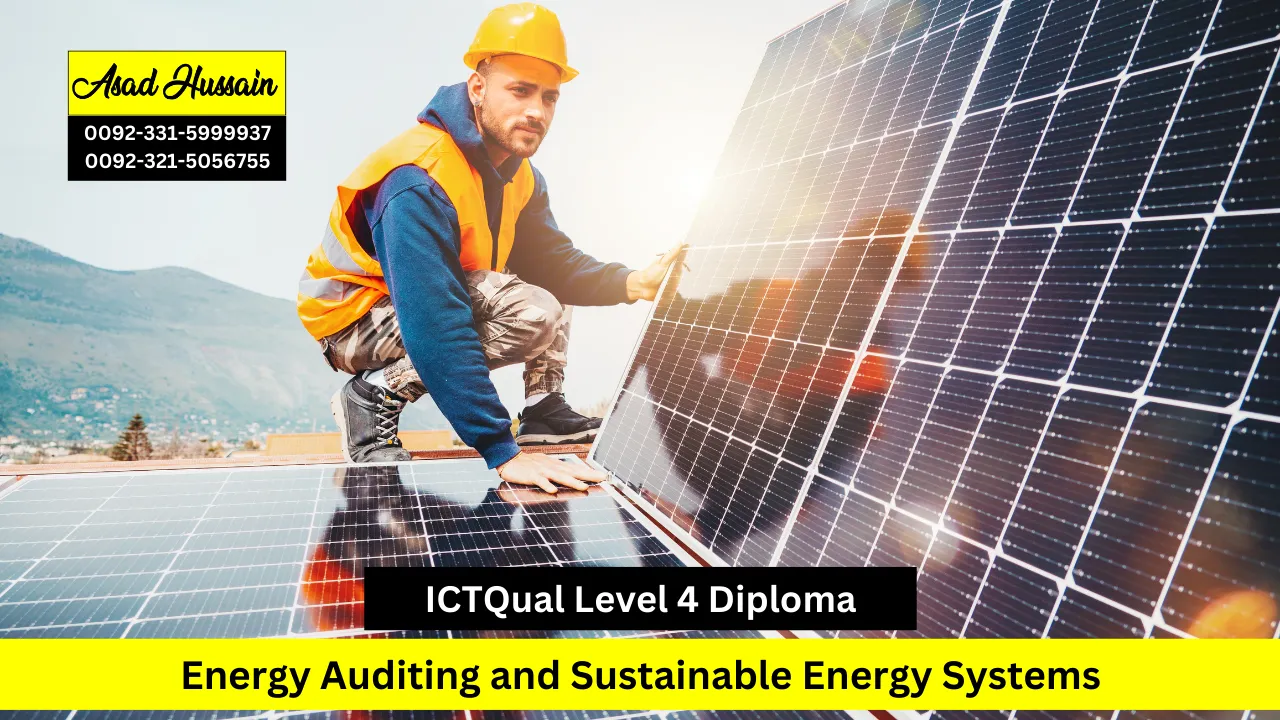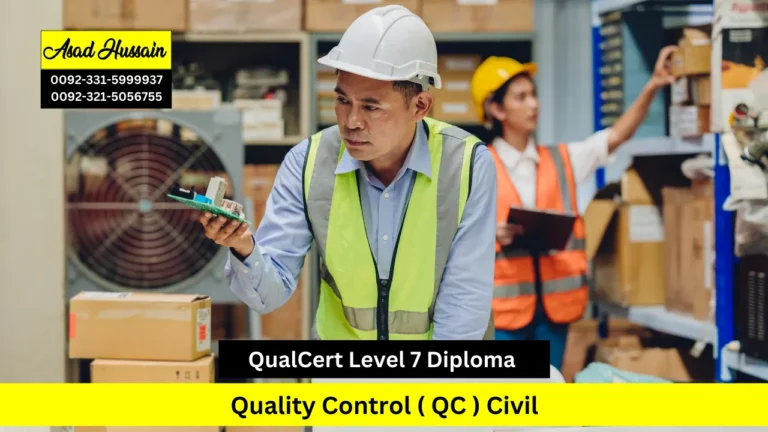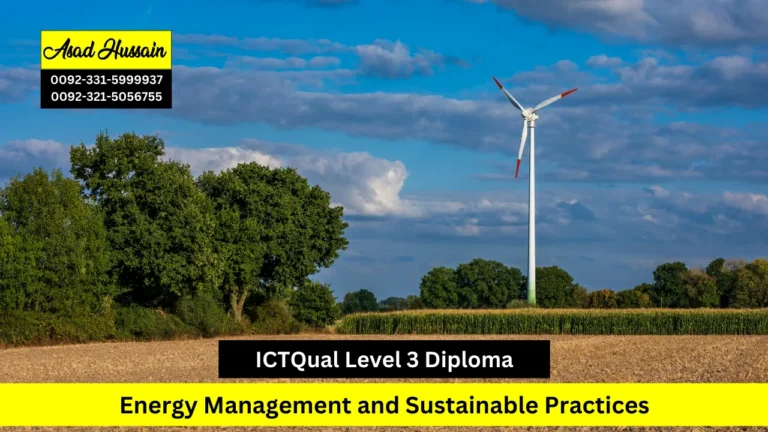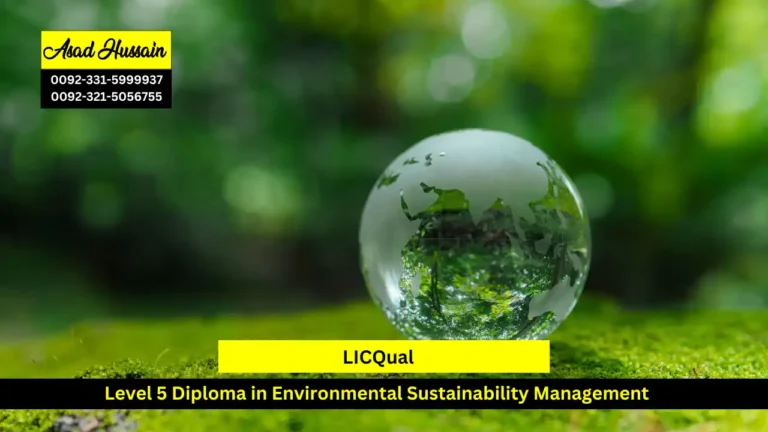In today’s world, where energy efficiency and sustainability are critical for both economic growth and environmental protection, the ability to assess, manage, and optimize energy systems has become indispensable. The ICTQual Level 4 Diploma in Energy Auditing and Sustainable Energy Systems is specifically designed to equip learners with the knowledge and practical skills needed to evaluate energy usage, identify inefficiencies, and implement sustainable solutions across various industries.
ICTQual Level 4 Diploma in Energy Auditing and Sustainable Energy Systems provides a comprehensive understanding of energy auditing techniques, sustainable energy systems, renewable energy technologies, and regulatory compliance frameworks. Learners will gain practical skills to perform detailed energy assessments, analyze energy consumption data, and recommend cost-effective and environmentally friendly energy solutions. The ICTQual Level 4 Diploma in Energy Auditing and Sustainable Energy Systems emphasizes the integration of technical knowledge with practical applications, ensuring that graduates can contribute effectively to energy optimization projects and sustainability initiatives.
By completing ICTQual Level 4 Diploma in Energy Auditing and Sustainable Energy Systems, learners will develop expertise in conducting energy audits, implementing energy-saving measures, and aligning organizational energy practices with international standards. Additionally, they will acquire critical skills in data analysis, reporting, and strategic planning, enabling them to influence decision-making and drive efficiency improvements in both private and public sector organizations.
Graduates of this diploma will be well-positioned to pursue careers such as Energy Auditor, Sustainability Consultant, Facilities Manager, or Renewable Energy Coordinator. With its strong focus on applied learning and industry relevance, the ICTQual Level 4 Diploma in Energy Auditing and Sustainable Energy Systems prepares professionals to make a tangible impact in advancing sustainable energy practices and promoting responsible energy management globally.
Program Highlights
Study Units
- Energy Auditing Fundamentals
- Industry-Specific Energy Auditing
- Carbon Footprint Analysis
- Sustainable Energy Systems
- Energy Legislation and Policies
- Energy Management and Optimization
- Sustainable Energy Policies and Planning
- Emerging Technologies and Innovations
- Project Management for Energy Audits
- Global Industry Case Studies
- Practical Workshops and Simulations
- Capstone Project
To enroll in the ICTQual Level 4 Diploma in Energy Auditing and Sustainable Energy Systems, applicants must meet specific academic, professional, and language criteria. These requirements ensure learners are well-prepared to succeed in the program and gain the practical and technical skills needed for careers in energy management and sustainability.
Age Requirements
- Applicants must be at least 18 years old at the time of enrollment.
- Mature learners aged 21 and above with relevant professional experience are encouraged to apply.
Educational Requirements
- Completion of a Level 3 qualification or equivalent in energy, engineering, environmental science, or a related discipline.
- Recognition of Prior Learning (RPL) may be considered for candidates with relevant experience but without formal qualifications.
Professional Experience
- 1–2 years of practical experience in energy management, engineering, or sustainability projects is desirable.
- Experience in conducting energy assessments or implementing efficiency initiatives is advantageous.
English Language Proficiency
- Non-native English speakers must demonstrate proficiency through IELTS (minimum 5.0) or an equivalent qualification.
- Evidence of prior education or work experience in English-medium environments may also be accepted.
The ICTQual Level 4 Diploma in Energy Auditing and Sustainable Energy Systems is designed to provide learners with in-depth knowledge, advanced technical skills, and practical expertise in energy auditing, sustainable energy solutions, and efficiency optimization. This program ensures that graduates are fully equipped to analyze energy systems, implement sustainability strategies, and contribute to organizational and global energy management initiatives.
Energy Auditing Fundamentals
- Gain a thorough understanding of the principles, methodologies, and frameworks of energy auditing.
- Learn to perform detailed energy assessments, identify inefficiencies, and recommend corrective measures.
- Develop skills to collect, interpret, and analyze energy consumption data effectively.
- Understand energy performance indicators and their role in monitoring organizational efficiency.
Industry-Specific Energy Auditing
- Apply advanced auditing techniques tailored to specific sectors, including manufacturing, construction, commercial, and industrial facilities.
- Identify industry-specific energy challenges and implement targeted solutions for improved performance.
- Analyze patterns of energy consumption and evaluate system efficiency in real-world scenarios.
- Develop recommendations that consider operational, financial, and environmental impacts.
Carbon Footprint Analysis
- Accurately calculate carbon emissions for organizations, projects, and facilities.
- Evaluate the environmental impact of energy consumption and production practices.
- Design strategies to minimize carbon emissions and promote sustainable operations.
- Integrate carbon footprint reduction initiatives into broader energy management plans.
Sustainable Energy Systems
- Assess and evaluate renewable energy systems such as solar, wind, hydro, and biomass solutions.
- Understand the technical, economic, and environmental feasibility of integrating sustainable energy into existing infrastructures.
- Analyze the lifecycle performance and efficiency of energy systems.
- Apply principles of energy conservation and renewable integration to real-world projects.
Energy Legislation and Policies
- Interpret and apply local, national, and international energy regulations, codes, and standards.
- Understand the legal obligations of organizations regarding energy efficiency and sustainability compliance.
- Ensure alignment of energy projects with regulatory and safety requirements.
- Develop policies and operational procedures that comply with legislative frameworks.
Energy Management and Optimization
- Implement effective energy management strategies to maximize efficiency and reduce waste.
- Develop systems for continuous monitoring, evaluation, and reporting of energy performance.
- Analyze energy usage trends to recommend long-term operational improvements.
- Apply problem-solving and decision-making skills to optimize energy operations.
Sustainable Energy Policies and Planning
- Design strategic energy plans for organizational or community-level sustainability initiatives.
- Align energy projects with environmental, social, and economic objectives.
- Formulate policies to support renewable energy adoption and energy conservation.
- Evaluate the impact of energy policies on operational and financial performance.
Emerging Technologies and Innovations
- Explore emerging energy technologies, including smart grids, energy storage systems, and AI-driven energy management solutions.
- Assess the potential impact and applicability of innovations on energy efficiency and sustainability.
- Develop strategies for adopting cutting-edge technologies in operational environments.
- Stay updated on trends and innovations shaping the global energy sector.
Project Management for Energy Audits
- Apply project management principles to plan, execute, and monitor energy audits effectively.
- Manage budgets, resources, and timelines for energy efficiency and renewable energy projects.
- Coordinate cross-functional teams and stakeholders in implementing energy solutions.
- Evaluate project outcomes and produce professional audit reports with actionable recommendations.
Global Industry Case Studies
- Analyze real-world case studies of successful energy management and auditing projects from across the globe.
- Compare international best practices and adapt them to local or organizational contexts.
- Identify lessons learned and innovative approaches to energy efficiency challenges.
- Develop the ability to apply theoretical knowledge to practical scenarios worldwide.
Practical Workshops and Simulations
- Participate in hands-on workshops to conduct energy audits, evaluate renewable systems, and implement efficiency measures.
- Use advanced simulation tools to model energy consumption, optimize systems, and predict performance outcomes.
- Gain experience in problem-solving, decision-making, and applying theoretical knowledge to real-life scenarios.
- Build confidence in professional skills required for energy management roles.
Capstone Project
- Design and execute a comprehensive, real-world energy audit or sustainable energy project.
- Integrate technical knowledge, analytical skills, and practical applications to solve complex energy challenges.
- Produce a professional report and presentation demonstrating mastery of auditing, sustainability, and energy optimization techniques.
- Showcase the ability to lead projects, apply innovative solutions, and achieve measurable energy efficiency outcomes.
Conclusion
Upon successful completion of the ICTQual Level 4 Diploma in Energy Auditing and Sustainable Energy Systems, learners will have developed a comprehensive blend of technical expertise, practical skills, and strategic insight. Graduates will be fully prepared to pursue professional roles such as Energy Auditor, Sustainability Consultant, Facilities Manager, or Renewable Energy Coordinator, enabling them to drive sustainable energy initiatives, implement efficiency strategies, and contribute to global efforts for environmental stewardship and responsible energy management.
The ICTQual Level 4 Diploma in Energy Auditing and Sustainable Energy Systems is designed for motivated learners seeking to enhance their expertise in energy management, sustainability, and renewable solutions. This program is ideal for individuals aiming to develop practical skills, gain industry-relevant knowledge, and assume professional roles that contribute to efficient energy use and environmental stewardship.
Educational Instructors and Trainers
- Professionals teaching energy management, sustainability, or environmental science courses.
- Instructors seeking to update curriculum with advanced auditing and sustainable energy practices.
- Trainers aiming to provide students with hands-on learning through practical workshops and simulations.
- Individuals wanting to strengthen their credibility and technical expertise in energy auditing.
Environmental Advocates and Activists
- Professionals engaged in sustainability campaigns, community energy initiatives, or environmental advocacy.
- Individuals aiming to acquire technical knowledge of renewable energy systems and carbon footprint reduction.
- Activists interested in applying energy auditing principles to promote environmentally responsible practices.
- Advocates looking to develop actionable strategies for energy efficiency and sustainability programs.
Corporate Social Responsibility (CSR) Professionals
- CSR managers and sustainability officers aiming to integrate energy efficiency into corporate initiatives.
- Professionals responsible for reporting on organizational energy use and sustainability performance.
- Individuals seeking knowledge in auditing, renewable energy, and regulatory compliance to support CSR goals.
- Employees looking to develop strategic programs aligned with global sustainability standards.
Students and Recent Graduates
- Learners with a background in engineering, environmental science, or energy studies seeking practical expertise.
- Graduates aiming to enhance employability and gain professional skills in energy auditing and sustainability.
- Students seeking hands-on experience through workshops, simulations, and capstone projects.
- Those looking to build a strong foundation for a career in energy management or renewable solutions.
Career Changers
- Professionals from other industries who wish to transition into energy management, sustainability, or auditing roles.
- Individuals seeking internationally recognized qualifications to support a career shift.
- Learners aiming to gain applied knowledge and practical skills relevant to the renewable energy sector.
- Those motivated to contribute to sustainable energy solutions and organizational efficiency.
Policy Makers and Regulators
- Government officials and regulators involved in energy, environment, or sustainability policy.
- Professionals responsible for enforcing energy regulations, standards, and compliance requirements.
- Individuals seeking to understand energy auditing and management principles to support policy development.
- Those aiming to apply best practices and evidence-based strategies to enhance regulatory frameworks.
Conclusion
This program is ideal for learners committed to advancing their careers in energy management, sustainability, and renewable solutions. Graduates will emerge with a combination of practical skills, technical knowledge, and strategic insight, enabling them to implement energy audits, drive efficiency initiatives, and contribute meaningfully to sustainable energy practices across industries and communities globally.







